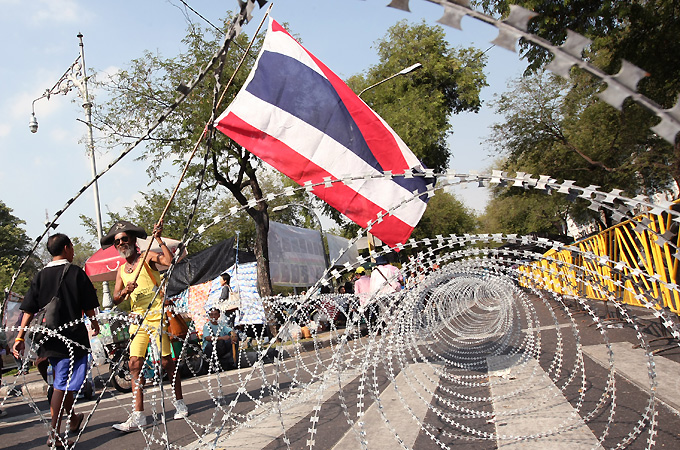Bangkok plans tough security law
Thailand will invoke special security laws to cope with political rallies in key areas in the capital.

 |
| Thailiand’s Yellow Shirts have called for rallies to oust the government [EPA] |
Thailand plans to invoke special security laws in Bangkok to cope with political rallies in the capital, the
scene of violent anti-government protests last year, the country’s government has said.
The Internal Security Act (ISA) will give authorities broad powers to control street rallies by nationalist “yellow shirt” protesters, who have continued plans for protests against the government.
Authorities would be able to impose curfews, operate checkpoints, restrict movements of protesters and act fast if rallies by the People’s Alliance for Democracy (PAD) turn violent or if they try to seize buildings.
Panitan Wattanayagorn, a government spokesman, on Tuesday said the Thai cabinet approved the use of the ISA from February 9 to 23 in seven districts, covering the prime minister’s office, parliament and the busy Rajprasong shopping district in central Bangkok.
“The cabinet approved the use of the law to maintain peace and safety,” said Panitan.
Soured relations
“Yellow Shirt” protesters are currently gathered outside the prime minister’s office. They have called an anti-government rally for Friday to step up calls to oust the government.
The group’s rallies in 2008 helped bring Prime Minister Abhisit Vejjajiva to power, but the Yellow Shirts have turned against him recently, calling for the government to take a tougher line against Cambodia over a disputed border area.
The Yellow Shirts have been protesting for two weeks in a bid to overthrow Abhisit and say they will expand their rally on Friday when parliament considers constitutional amendments whose passage would meet a key condition for elections this year.
The group has been confined to areas around the prime minister’s office and have not said where they will march, insisting they will remain peaceful.
Extra police have been deployed to the area and key government buildings barricaded with razor wire.
“Several important places are located in the area and there may be incitement of unrest or rebellion so government wanted to keep them under control,” Panitan said.
Rival anti-government protesters, the “red shirts”, also plan separate rallies on February 13 and February 19. seeking the release of their leaders from prison.
Border clashes
Meanwhile, tensions remain high on the Thai-Cambodian border following four days of firefight, that killed eight people.
Fighting had ceased on Tuesday, but thousands of families on both sides of the frontier have been displaced by the recent violence surrounding the Preah Vihear Hindu Temple that is a Unesco World Heritage Site.
On Tuesday, Unesco said it will send an urgent mission to examine the 900 year old temple that was reportedly damaged in the fighting that began on Friday.
Thailand and Cambodia both accuse the other of starting the ongoing clashes.
Although Cambodia controls the temple itself, there is uncertainlty around ownership of the scrub next to the ruins, resulting in disagreements.